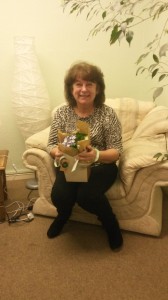Pauline Reed, who qualified as social worker in 1978, shared with her fellow SIM members at the January meeting, on 15/01/2015, information about her current work with women in prison who have lost children to Adoption. Pauline firstly placed the context of her work within the history of Adoption policy and practice.
In England and Wales Adoption did not become a legal entity until 1926 when the first Adoption Act was passed. From the late 1950s to the early 1970s many babies were placed for adoption, the peak being in 1967 when around 26,000 babies were adopted. This was a time of great social change, when more opportunities became open to women but at the same time it remained extremely shameful for an unmarried woman to give birth to a baby. Thus unmarried mothers became greatly stigmatised by their situation, as did their illegitimate babies, and so there was considerable societal pressure placed upon both the woman and her family to place the baby for adoption with a married couple. This meant that the child became legitimised; it gave the mother a chance to have a fresh start and allowed married couples to have the joy of becoming parents. For these reasons, the adoptions remained ‘secret’ and the door to the past was kept legally ‘locked’. Interestingly, the father of the baby, who would have been able to legitimise the child, was usually able to avoid any of this stigma.
From the mid-70s society’s attitudes started to change significantly and, as a result, the stigma of being an unmarried mother has in the 21st century largely disappeared. At the same time women have begun to find more options open to them. For example, the contraceptive pill became available and also better financial support has been put in place for single parents. These two issues have meant that it is now quite rare for an unmarried mother to request an adoptive family for her baby. Nevertheless the issue of stigma still exists for some women in our society, especially in the particular area of Adoption whereby the courts have deemed the mother unfit to look after her child or children. Media accounts of high profile cases regularly demonstrate that even today mothers are often judged much more harshly than the fathers of the children.
The women who are in prison and who have lost children to adoption have broken many of societies taboos. However, the majority of them have had awful childhoods in which they were poorly parented themselves, often experiencing emotional, physical and sexual abuse. Furthermore, they have often been in care where they were not always kept safe, as documented in some recently-reported media cases. Thus drugs and alcohol have often been used for ‘self-medication’ to blot out the painful memories and it is often this that leads to offences being committed. Again, in relative terms, women are often dealt with much more severely than men by the courts. Furthermore, their vulnerability means that they often end up with violent partners and a significant number of women lose their children to adoption because of their exposure to domestic violence.
Pauline’s work mainly involves supporting the women to enable them to participate fully in the exchange of annual letters with the adoptive parents, via the Letterbox provided by every local authority’s Adoption service. This support is so important for the birth mothers’ mental health and is greatly valued by everyone involved in Adoption, as it is also in the children’s best interests to have as much information as possibly about their birth family.
Pauline made a suggestion for Programme Action Committee (PAC) which received a positive response. She explained that it can be difficult for mothers in prison to keep safely together all their letters and mementos. Pauline, therefore, proposed that funds might be raised to provide the mothers with Memory Boxes in which to keep their precious belongings.
A token of appreciation was given at the end of her talk in the form of a bouquet.
Thanks, Pauline.


